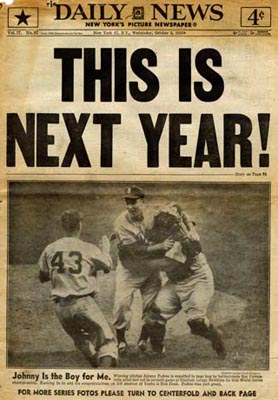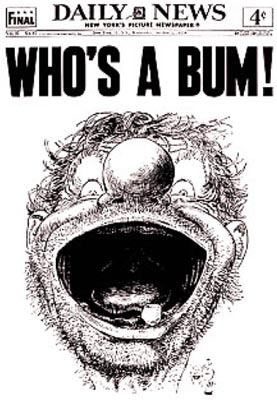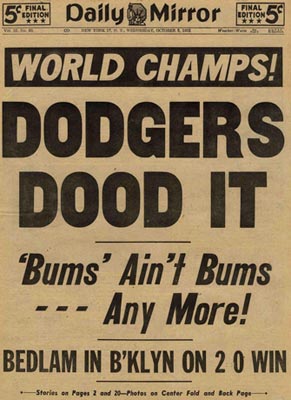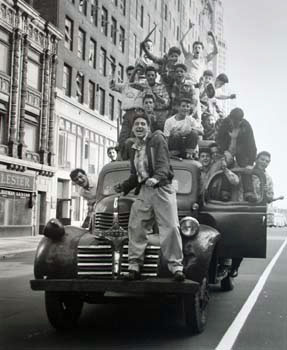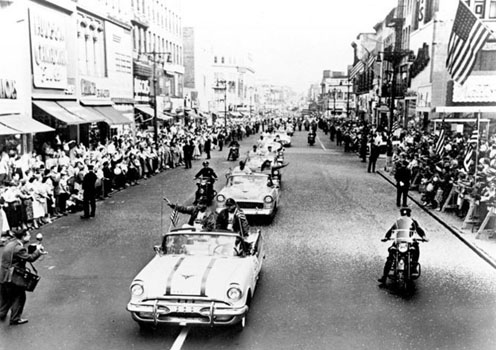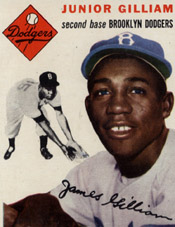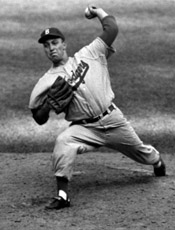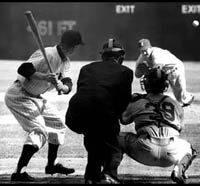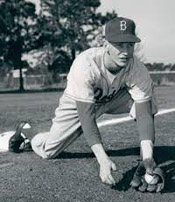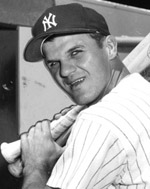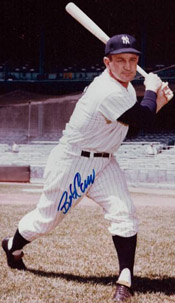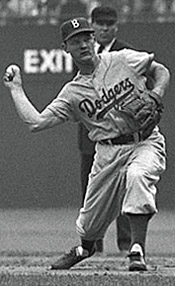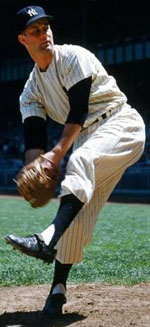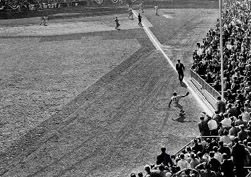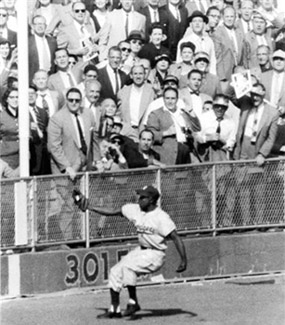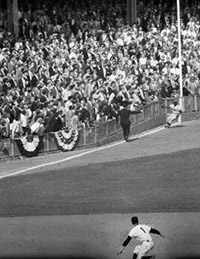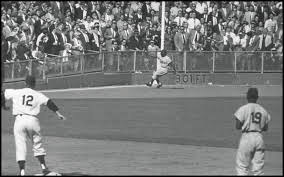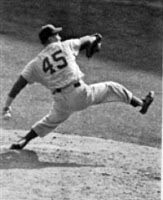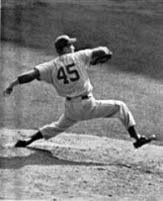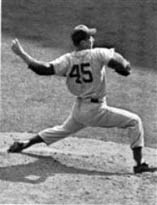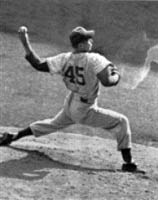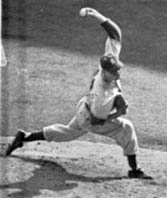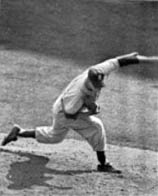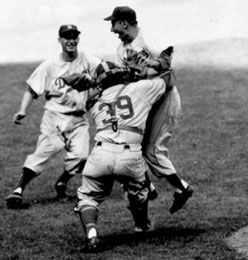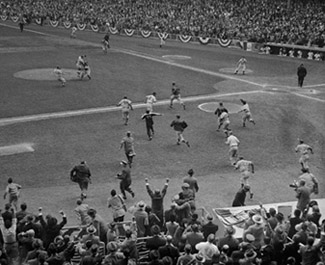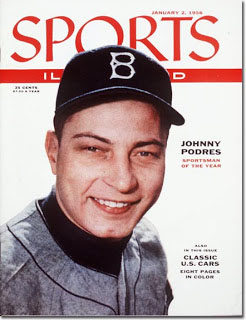1955 - Game 7: Brooklyn Dodgers @ New York Yankees
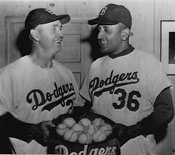
Walt Alston and Don Newcombe
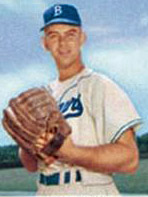
Clem Labine
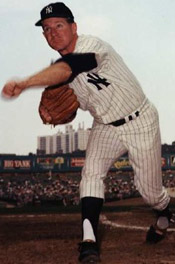
Whitey Ford
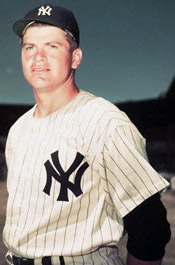
Bob Turley
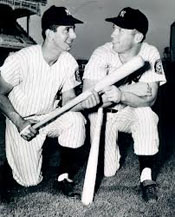
Billy Martin and Mickey Mantle
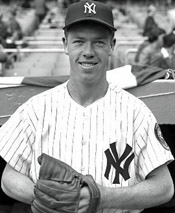
Gil McDougald
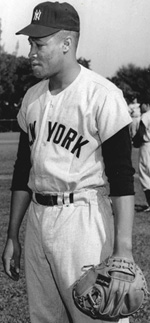
Elston Howard
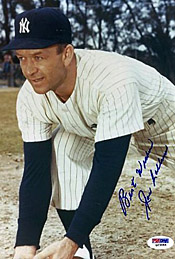
Joe Collins
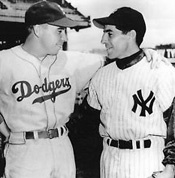
Pee Wee Reese and Phil Rizzuto before Game One
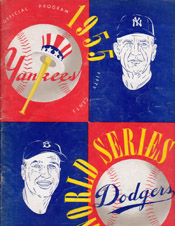
|
Pennant Races
The Brooklyn Dodgers fielded essentially the same team in 1955 that won the NL pennant in 1953, just more experienced.
- Walter Alston's second Dodger club quickly made a shambles of the NL pennant race. They won their first ten games and had an eleven-game streak shortly afterwards.
- By May 15, their record was an astounding 25-4 with a nine-game lead. They coasted from there, maintaining a double-digit lead in games from June 11 to the end of the season with the final margin being 13.5 games.
- The Dodgers clinched the pennant September 8, the earliest date in NL history.
A team that good has balance - pitching, hitting, and defense.
- The Bums led the NL in runs with 857, 96 better than the Reds. Three regulars hit over .300: C Roy Campanella (.318), RF Carl Furillo (.314), and CF Duke Snider (.309). All three finished in the top ten in slugging %, with Snider at .628 second behind only Willie Mays. Duke led the league in runs scored.
Campanella's hitting numbers were especially impressive since he suffered from injuries to his left hand all year. He recalled: I still couldn't move my third and little fingers too well ... Every time I caught a ball or hit one, there was a shock to the nerves in that hand. I had to use a sponge. That didn't help much, so I began wearing a regular dress glove underneath the mitt.
- Alston's mound staff also topped the Senior Circuit in ERA at 3.68 and in fewest runs allowed (650) despite playing half their games in the most hitter-friendly park in the league. Don Newcombe won 20 and dropped only 5. After him, the victories were spread out over twelve other hurlers. Starter-reliever Clem Labine was next in victories with 13.
- To complete their trifecta, the Dodgers ranked second in the NL in fielding %, only .003 behind the Phillies.
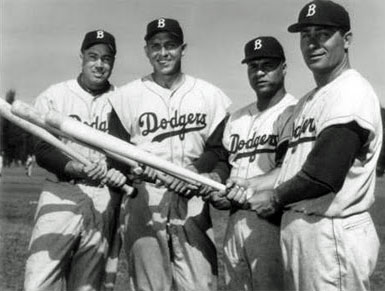
L-R: Duke Snider, Gil Hodges, Roy Campanella, Carl Furillo
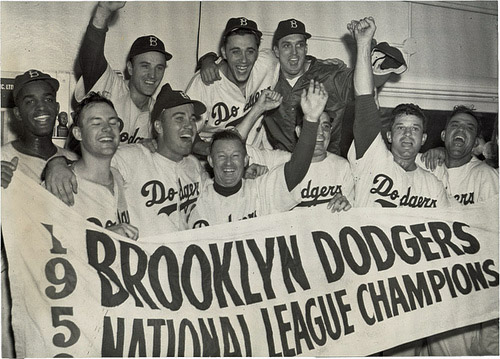
The Dodgers clinched their pennant on September 9 but had to wait until the final weekend to learn who their opponent in the Fall Classic would be.
- Stung by having their five-year pennant streak stopped by Cleveland in 1954 despite winning 104 games, the Yankees set their sights on regaining the top spot.
- Casey Stengel considered his starting eight as good as anybody's. The big question mark was pitching. He relied on Bullet Bob Turley, newly acquired from the Orioles, to fill the second starter spot behind Whitey Ford. Veteran southpaw Tommy Byrne, known for good stuff that he couldn't always control, learned to change speeds and won the Comeback Player of the Year with a 16-5 record. Ford finished with 18 victories with Turley one behind.
- CF Mickey Mantle, finally laying off the high inside pitches, began convincing hardened Yankee fans that he was indeed the heir apparent to the great Joe DiMaggio. The Mick hit .306 with 37 HR, and drove in 99.
- Ford won six of his first seven, and Turley won eight of nine. Still, the Bronx Bombers didn't settle into first place until May 21. They stayed in the lead until July 31 when the White Sox took their place, with Cleveland tying NY for second. The surging Red Sox were only three out.
- The race stayed tight into early September, when Billy Martin returned from the Army on a furlough that extended to the day the World Series would start. New York sportswriter Bill Corum wrote from Chicago: I picked up the paper and the headline said that Billy Martin had rejoined the Yankees. That, of course, just about settled the pennant race in the junior league. The Indians have pitching, the local Sox have a pretty good club, and the Bo Sox of Boston are belligerent. But you don't beat Stengel when he's got Billy Martin. Stengel rejoiced when that fresh little bastard, as he called him, returned. How I love him. Martin took over 2B, allowing Casey to move Gil McDougald to 3B to replace slumping Andy Carey. Billy hit .300 in 20 games and the Yanks clinched the flag the last Friday of the season, topping Cleveland by three in the final standings.
So the Dodgers, runners-up in all seven of their World Series starting in 1916, faced the team that had beaten them in their last five Fall Classic appearances.
Alston expressed confidence heading into his first World Series.
- As his team worked out at Yankee Stadium the day before Game One, the tall, soft-spoken Dodger pilot said, Listening to the way the boys talk, it is evident that they are confident about this thing. That naturally makes me confident. He didn't think the Dodgers were overawed or afraid of the Yankees. I don't see any reason why they should be.
- Clem Labine warmed up and was pronounced back at full strength. Jackie Robinson, ten pounds lighter than he was two weeks earlier, would start at 3B, the fourth position he had played in World Series competition (along with 1B, 2B, and LF).
- Since this was the first Series played in Daylight Saving Time, the infamous Yankee Stadium shadows would not be as bad as in the past.
Joe DiMaggio gave the Dodgers incentive against his old team. During the pennant race, he made remarks that questioned whether the Dodgers, despite their gaudy record, were capable of winning the World Series. They can't beat the Yankees in the World Series. I guess the only thing that can cure them is a brain-washing. It has gotten so bad with them in Brooklyn they can't even say the word "Yankees." It always is "those blankety-blank lucky Yankees" - to put it politely."
Alston may or may not have cited Joltin' Joe's in his pregame remarks to the team, but coach Jake Pitler called it the greatest pregame talk I've ever heard.
On the other side, Stengel worried about his squad's lack of World Series experience.
- No pitcher on his staff had ever beaten the Brooks in a World Series. Allie Reynolds had retired, and Vic Raschi had been traded. Only Ford and Byrne had ever pitched in a series before.
- Mantle had suffered a torn thigh muscle in mid-September that might relegate him to pinch-hitting and perhaps some outfield play in the much smaller Ebbets Field. Old Case would have to rely on youngsters Ellie Howard and Bob Cerv to join weak-kneed Irv Noren and solid veteran Hank Bauer in the outfield.
- On the infield, Martin had his furlough extended to the end of the Series. But Billy's fielding had never been topnotch. 1B Bill Skowron had foolishly broken his toe kicking a water cooler September 16 after striking out. Untested in the Fall Classic, Moose would start against lefties while veteran Joe Collins would face the righties. At SS, neither old standby, Phil Rizzuto or Jerry Coleman, had been hitting recently.
When Rizzuto started Game One, it marked the 31st time that he and Pee Wee Reese had been the opposing shortstops in a World Series game.
- The oddsmakers didn't sympathize with Stengel's problems. Despite Brooklyn's runaway NL pennant, they made the Bombers 13-10 favorites to improve their amazing Series record to 17-4.
On September 16, Mantle suffered a severe muscle tear in the back of his right thigh while beating out a bunt. He made only two appearances the rest of the season, both as a pinch hitter.
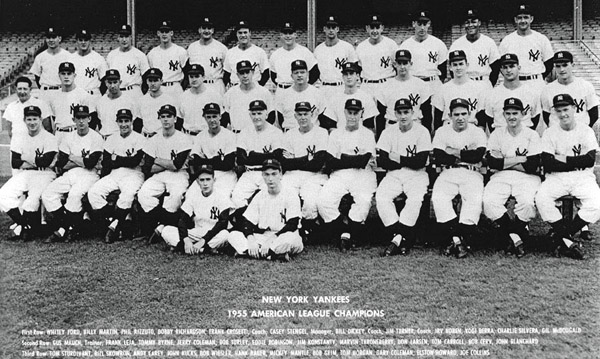
Series Results
- Wednesday, September 28 @ New York: Yankees 6 Dodgers 5
WP: Whitey Ford; LP: Don Newcombe
- Thursday, September 29 @ New York: Yankees 4 Dodgers 2
WP: Tommy Byrne; LP: Billy Loes
- Friday, September 30 @ Brooklyn: Dodgers 8 Yankees 3
WP: Johnny Podres; LP: Bob Turley
- Saturday, October 1 @ Brooklyn: Dodgers 8 Yankees 5
WP: Clem Labine; LP: Don Larsen
- Sunday, October 2 @ Brooklyn: Dodgers 5 Yankees 3
WP: Roger Craig; LP: Bob Grim
- Monday, October 3 @ New York: Yankees 5 Dodgers 1
WP: Ford; LP: Karl Spooner
|
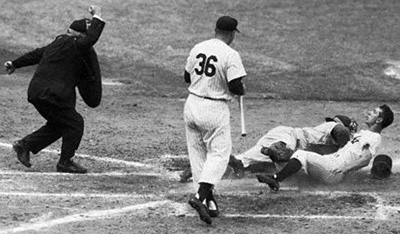
Bill Martin out stealing home in 6th inning of Game One with Joe Collins at bat.
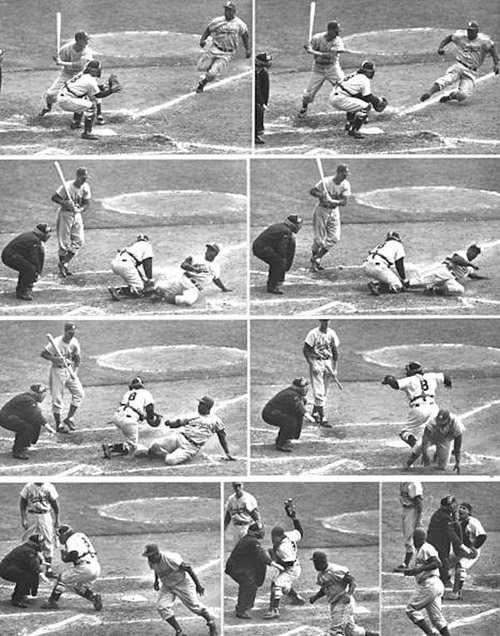
Jackie Robinson steals home in 8th inning of Game One to the chagrin of Yogi Berra,
who insisted to his dying day that Jackie was out.
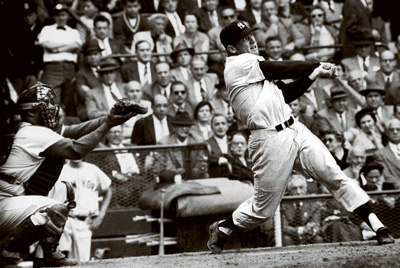
Mantle cracks HR against Johnny Podres in Game 3 at Ebbets Field.
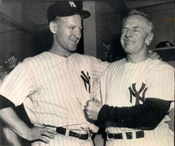
Casey Stengel congratulates
Whitey
Ford after Game Six
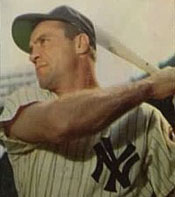
Hank Bauer
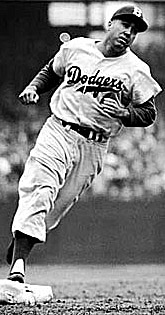
Duke Snider
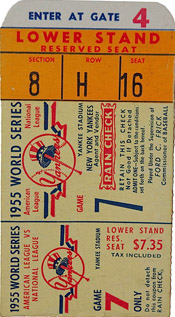
|
Game 7: Tuesday, October 4 @ New York
The finale would be a battle of portsiders.
- Right after Game Six, Stengel named his Game Seven starter: 34-year-old Tommy Byrne. Coming off the best year of his career (16-5, 3.15 ERA), he became the first southpaw to pitch a complete game against the Dodgers in '55 when he beat them 4-2 in Game Two. Casey: I thought he was the best of my other starters [after Ford], and I feel he can do as well the second time.
- Casey announced that every Yankee pitcher would be in the bullpen, even Ford who twirled a four-hitter in Game Six. My pitchers will have most of the winter to rest. If necessary, everybody works tomorrow. And that goes for Ford, too. He pitched a beautiful, smart game out there today, but he's going to have to be ready overnight if I should need him.
- Bauer reinjured his right thigh while running hard to avoid a double play. He had originally pulled it in Game Two. It pains, said the former Marine, but I think I'll be able to play tomorrow.
- Alston planned to deploy Johnny Podres, who went the distance in Game Three (on his 23rd birthday) after not finishing his last thirteen starts of the regular season. Informed of the choice, Stengel said he would employ his "right-handed" line-up that included Bauer, Cerv, and Howard in the OF and Skowron at 1B. If I feel later that we need defensive protection, I'll switch to Collins at first base ...
- But the Ole Perfessor reserved the right to change his mind by game time. Podres did well against us [in Game Three]. He got my right-handed hitters out, and I have a hunch my lefties might not be bothered too much by him. We'll see.
- The Dodgers' biggest worry was the knee injury that caused Duke Snider to leave Game Six after three innings. Duke had plastered Yankee pitching to the tune of 8-for-22 (.364) with four HRs and seven RBIs. The Dodger CF promised that, if he could walk, he would play.
- However, Jackie Robinson wouldn't play because of a bruised left heel. You know it had to hurt bad if such a warrior couldn't take the field in the most important game of the season.
- The bookies gave 7-to-5 odds that the tired, battered Yanks would win Game Seven over the tired, battered Dodgers.
Both teams seemed relaxed before the Big Game.
- Reese and Coach Billy Herman beat Gil Hodges and Ed Roebuck in their usual game of bridge while waiting for the Yankees to take batting practice.
- Fresco Thompson, Brooklyn's vice president in charge of the farm system, said while moving to his seat next to the Dodger dugout, If we don't take this one, we'd better stop winning pennants.
- Robinson confirmed that he would not be in the lineup. I could play, but Don Hoak will do a much better job for us. With my heel the way it is, I just can't make a quick start, and I wouldn't have a chance on any ball that wasn't hit right at me.
- The Yankees engaged in their normal "light conversation and airy badinage" around the batting cage as if they had nothing on their minds. One topic was the upcoming good-will tour of Japan.
- Lefty Bob Wiesler pitched batting practice to the Yankee hitters, who kept calling for change-ups to prepare for Podres.
Roger Kahn explained how the previous Dodger manager, Charlie Dressen, had spent months teaching Podres a change of pace. "Think fastball," Dressen said.
"Throw a fastball. Just when you release - zip! Pull down the window shade." The downward motion takes speed off the pitch at the same time as it increases rotation. The batter sees a rapidly spinning baseball. Fastball, he thinks. But the rapidly spinning pitch is moving slowly. Rotation is the fooler.
- NY coach Frank Crosetti hoped to celebrate his 45th birthday with a victory in his 80th World Series game as a player or coach.
- Yankee starter Byrne took the subway to the Stadium unrecognized. His opposite number, Podres, had to fight his way into the ballpark through autograph seekers who thought he was OF George Shuba. Before the day was over, every fan would recognize Johnny Podres.
Only once before in World Series history had a pitcher with a losing record in the regular season started the final game - another Dodger, Hal Gregg, in 1947.
Podres had started the season 7-3 but hurt his arm and went on the disabled list for a month. As a result, he finished only 9-10. I honestly didn't think I would get a start in the Series, he recalled.
In fact, the Dodger brain trust debated leaving him off the World Series roster until he had real good stuff (his words) in a late start against Pittsburgh.
- Up to and even after game time, fans could still plunk down $2.10 and get a bleacher seat.
- Among the 62,463, in attendance on a beautiful but slightly hazy autumn day with temperature in the high 60s were famous jockey Eddie Arcaro in Yankee owner Dan Topping's box and heavyweight champion Rocky Marciano.
- The Gillette Safety Razor Company had paid $1 million to sponsor the World Series on NBC. An estimated 60 million tuned in for Game Seven to hear Yankees' announcer Mel Allen and the Dodgers' Vince Scully all the action.
The '55 Fall Classic was the first telecast in color. However, the response was overwhelmingly negative. The first-generation color cameras couldn't compensate for the late afternoon shadows produced in both ballparks. One telegram to NBC complained PICTURES TOO DARK LOSING LOTS OF FRIENDS FOR YOUR COMPANY.
|
Brooklyn Lineup
| Junior Gilliam |
LF |
| Pee Wee Reese |
SS |
| Duke Snider |
CF |
| Roy Campanella |
C |
| Carl Furillo |
RF |
| Gil Hodges |
1B |
| Don Hoak |
3B |
| Don Zimmer |
2B |
| Johnny Podres |
P |
|
 |
 |
New York Lineup
| Phil Rizzuto |
SS |
| Billy Martin |
2B |
| Gil McDougald |
3B |
| Yogi Berra |
C |
| Hank Bauer |
RF |
| Bill Skowron |
1B |
| Bob Cerv |
CF |
| Elston Howard |
LF |
| Tommy Byrne |
P |
|
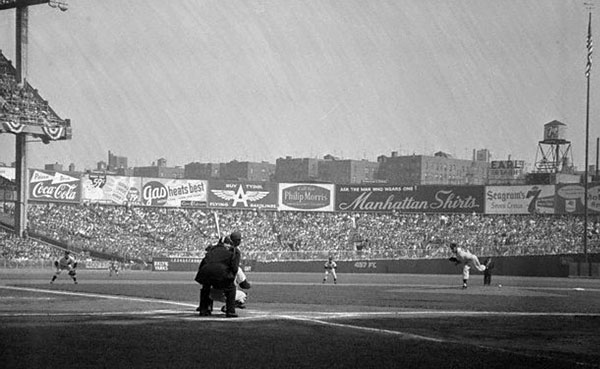
Tommy Byrne throws the first pitch of Game 7 to Junior Gilliam. |
|
|
1st inning
- Byrne, the "Wake Forest Deacon" as Mutual radio announcer Al Helfer called him, had an easy first inning.
Switch-hitter Junior Gilliam (6-for-20, .300 in the Series) hit right-handed and sent a chopper over the mound to SS Rizzuto, who threw out the fleet batter at 1B.
Reese flied to CF Cerv on an 0-1 pitch.
His knee heavily taped, Snider stepped in to the applause of the crowd. He ripped a fastball to 2B Martin's left and was out at 1B.
- Podres, who grew up a Dodger fan, also started strong, mixing speeds.
Podres felt the pressure was on Byrne, not him. If I had been a 20-game winner, there would be a lot of pressure on me because I'd be supposed to win. But there was no pressure on me. If I lost, they would have said, "How would you expect him to beat the Yankees twice?"
On the bus to the Stadium, Podres had told the team to get me one today; just get me one run.
Rizzuto, who that day broke Joe DiMaggio's record for most World Series games played, fouled a soft curve ball to C Campanella to the right of the plate.
Batting from a wide stance, Martin lofted a fly to Gilliam in the LF corner.
McDougald, hitting only .174, worked the count full before plate umpire Jim Honochick called him out on a slow curve.
For several years, Stengel had tried to get McDougald to change his unorthodox stance in which he faced the P and leaned back on his right foot. When Gil started slowly in April, the Old Man yelled at him, I want you to change that horseshit stance of yours! I don't care how you change it! Just change it, and I mean now! Gil bolted away with a red neck but, that afternoon, spent extra time in the batting cage practicing a more conventional stance. With a better chance to hit outside pitches, he improved his average although he worried that he would get hit in the head by a pitch.
2nd inning
- Campanella started the Series 0-for-8 before breaking out with a HR in Ebbets Field. Now he whacked a fastball to Martin who threw to Skowron.
Furillo (8-for-24 for .333 average), hit a HR in Game One. This time he got hold of the first pitch but Howard made the running catch in LCF.
Hodges (6-for-22 for .273 with a HR) walked to become the first base runner of the day.
Hoak had batted just once in the Series, walking as a pinch-hitter. He fell into an 0-2 hole, then grounded slowly to Martin who threw him out.
- Berra, the only member of either lineup who had hit safely in all six games, brought his .450 (9-for-20) average to the dish. He gave Yankee fans a brief thrill when he hit a curve into CF. But a limping Snider made the catch.
Bauer (6-for-10, .600)
grounded a curve off the end of the bat to 2B Don Zimmer.
Skowron smacked a fast ball down the LF line for a one-hop ground-rule double.
Cerv, hitting only .167, had a chance to give the Yanks the lead. Overanxious, the former Nebraska basketball player ripped at a high fast ball and missed, then did the same to a slow curve. Podres fed him another curve that he grounded to Reese to end the mild threat.
3rd inning
- Zimmer (2-for-7) hit the first pitch toward Rizzuto, who moved to his left and threw to 1B for the putout.
Podres received strong applause as he strode to the plate. He got a piece of an overhand curve and grounded to 2B.
Byrne walked Gilliam on four pitches.
That gave the Dodgers a chance to utilize their best hit-and-run combination, Gilliam and Reese. But Alston didn't employ the strategy, and Pee Wee lined out to CF.
- Firing straight overhand, Podres induced Howard to fly to CF.
Byrne, considered a good-hitting P who pinch hit in Game Five, received a nice hand from the Yankee fans. Podres fell behind 3-0, then got his rival moundsman on a called strike three at the knees.
Scooter Rizzuto took four straight balls.
The Dodger lefty continued to struggle with his control, throwing two more wide ones to bring Reese to the mound for a conference. After a strike, Martin singled to RF, Phil stopping at 2B. For the first time in the game, a side had two men on base.
Alston walked out to talk to his hurler as RHP Don Bessant started throwing the bullpen along with Don Newcombe.
Campanella told Alston, He's all right, Skip. He's got good stuff.
Again, Johnny fell behind with two errant slow curves to McDougald before firing a fast one through there. With the runners breaking on 3-1, Gil fouled the pitch. He then bounced toward Hoak but the ball hit Rizzuto as he slid into 3B.
On the Dodger bench, P Carl Erskine told his teammates, That's an omen, fellas!
4th inning
- Byrne registered his first strikeout when Snider whiffed.
Campy hit a 1-0 pitch into the LF corner, where it got away from Howard. The surprisingly fast Dodger C roared into 2B with a double - the first Brooklyn hit of the game and his first safety in the four games at Yankee Stadium.
Furillo drilled the first pitch foul into the crowd down the LF line. After working the count to 3-2, Carl dribbled the ball to Rizzuto, who threw him out as Campanella took 3B.
Hodges fell behind 1-2, then lined a single in front of Howard to score the all-important first run. It was RBI #5 for Gil in the series.
McDougald threw out his 3B counterpart, Hoak, to end the inning.
Dodgers 1 Yankees 0
- With the Yankees muttering, "We can beat this guy. He's got nothing," Podres regained his control after a shaky third.
Berra hit a harmless popup into LCF. Snider and Gilliam converged, but Snider backed off at the last moment, and the ball dropped between them for a double.
Bauer hit the first delivery to Furillo in RF, Berra holding 2B.
Mixing speeds and locations, Podres got Skowron to ground out to Zimmer, Yogi moving to 3B.
The Yanks now faced the same situation the Dodgers enjoyed in the top of the inning - man on 3B with two outs. But Podres induced Cerv to pop up to Reese in short LCF. Intent on avoiding the Alphonse-Gaston act that put Berra on, the Dodger captain waved his arms like the blades of a helicopter.
5th inning
- Zimmer fanned on a 1-2 curve.
Podres fouled out to McDougald.
Gilliam grounded out to his counterpart, Martin.
- Howard drove the first pitch to deep LF, but Gilliam took it in front of the wall.
Byrne again looked at a third strike.
Rizzuto bounced out to Hoak.
6th inning
- Reese poked a liner over Rizzuto's head for a single to put the Dodgers' leadoff batter on for the first time.
Would Alston call for Snider to sacrifice the potential insurance run to 2B? In the 7th game of the World Series, the answer is yes. Duke dropped the bunt to the left of the mound. Byrne rushed toward the 3B line, grabbed the ball, whirled, and fired to first. Skowron tried to take the wide throw and make the tag at the same time but dropped the ball as Snider ran through the glove. The scorer credited Snider with a sacrifice and Skowron with an error.
After the third-place hitter bunted, the cleanup man, Campanella, did the same. This time Byrne's peg to 1B was true.
Stengel came out to visit Byrne but left him in to walk Furillo intentionally.
Casey returned to the hill and called in righty Bob Grim to face Hodges. Grim had appeared in two games, taking the loss in Game Five. Byrne received a nice hand as he headed to the dugout.
Gil skied a fly to deep RCF that Cerv snared. Reese scored easily, and Snider raced to 3B. Hodges had now driven in both the Brooklyn runs.
Grim's 0-1 pitch to Hoak bounced in the dirt away from Berra, who couldn't find the ball for a moment. Snider held 3B, but Furillo scampered to 2B. Hoak then walked to reload the sacks.
George Shuba hit for Zimmer in what would prove to be a fateful move. Shotgun George grounded out 4-3 to avoid further damage.
Dodgers 2 Yankees 0
- Alston told Podres as he left for the mound, They got to catch us. We don't have to catch them. Gilliam moved from LF to 2B to replace Zimmer. Instead of keeping pinch hitter Shuba in the game, Alston sent fleet Cuban Sandy Amoros out to LF. Sandy batted lefthanded but, more importantly as it turned out, threw lefthanded.
Podres made Dodger fans groan by walking the leadoff man, Martin, on four pitches.
Alston got Clem Labine and Don Bessant working in the bullpen but stayed with his lefty.
McDougald dropped a bunt down the 3B line. Podres' throw to first was too late. The potential tying runs were just that quickly on base.
With Berra, the Yanks' toughest hitter (with Mantle out of action) coming up, Reese came to the mound as Podres thought to himself, I got out of it with two on before. Reese asked, You all right, Johnny? Podres nodded. Then Alston and Campanella arrived. Walt asked his catcher, Has he still got it? Campy told his pitcher, Take it easy now. Then to the manager: He'll be all right.
Mantle: There was no one I would rather see batting in those situations than Yogi unless it was me.
In his own words, Johnny threw a pitch that was high out over the plate, a fastball that had something on it, and he (Berra) didn't get around too good on the ball, and he sliced it to left field ... At first when the ball went up, I wasn't concerned. In fact, when he hit it, I bent over and picked up the resin bag and said to myself, "Well, there's one out. But then I looked back, and I could see the ball keep slicing toward the line ... The crowd had risen to their feet. Would the fly go into the stands for a HR, slice foul into the stands, be held up by a left-to-right wind and drop for a double, or be caught? Amoros, playing Berra to pull as instructed by the dugout, raced fearlessly over from LCF and, at the last moment, stuck out his right gloved hand and speared the ball. Then, just as remarkably, he stopped before careening into the low fence. Hearing Reese yelling for the ball, Amoros turned and threw straight at the chest of Pee Wee, who stood just inside the 3B line at the back of the infield dirt. Having taken a peek at the runners while awaiting the throw, Reese whirled and fired a strike across the diamond to Hodges, who stretched his entire 6'1" height to double McDougald by a hair.
A few feet further left and Berra's fly would have landed foul in the stands. A few feet further out and it would have landed in the bleachers for a three-run homer.
Asked after the game how he caught the ball, Amoros answered in his Cuban accent. I don'tknow. I run like hell. ... I kept my eyes on the ball ... never looked anywhere else. It stayed up just long enough to fall into my glove ... I never hit the fence, but I was only this far from it (holding his hands about 20" apart).
Jerry Coleman: We just couldn't believe it. In the dugout, we just shook our heads. There's no way he should have made that catch. There was no way he should have been playing Yogi so close to the outfield fence. It was a great play, but at the same time it was also a colossal fluke.
Podres: My juices were really flowing after that.
Bauer went out 6-3
to end the threat.
Cleveland's Bob Neal botched the double play call on Mutual Radio. He had reported Gilliam's move to 2B but hadn't noticed Amoros in LF. So he had Gilliam charging for Berra's ball and snaring it. Then he said nothing for a few seconds (marking his scorecard perhaps?) as the crowd roared in response to Reese's throw to 1B. Neal corrected his error when he summarized what happened and pointed out that a right-handed LF would not have made the catch.
7th inning
- Greeted by even more applause, Podres grounded to 2B.
Gilliam, batting left-handed for the first time in the game, hit a liner that Bauer trapped for a single.
With Reese at the plate, Berra threw out Junior trying to steal 2B, Rizzuto making the tag.
Reese fanned.
- Play was delayed when a fan leaped over the box seat railing in LF and raced out to get Snider's autograph on his program. The young man was ejected from the park but escaped arrest.
Reese came in and scooped up Skowron's grounder and threw out the former Purdue football star.
Cerv followed suit, 6-3.
Howard grounded a hard single between a diving Reese and Hoak.
The crowd came alive as Mantle came out to bat for Grim. Mickey had homered off Podres in Ebbets Field in Game Three. Would he tie the game with one swing?
No, he wouldn't. Batting right-handed,
Mantle skied to Reese in short LF.
8th inning
- Bob Turley toed the slab for NY. In keeping with his poor finish in the regular season, Bullet Bob had lasted only 1 1/3 in the Dodgers' 8-3 Game Three romp.
Snider took a called third strike.
Campy hit a lazy fly to Howard.
Furillo lofted a fast ball to Cerv.
- Six outs for Brooklyn's first World Series championship!
Rizzuto lined a hit to LCF, Amoros cutting off the ball to hold Phil to a single.
Labine started throwing in the bullpen.
Labine recalled: I was warming up in the bullpen during the last three innings, but my roomie [Podres] took care of them and that was okay. I'm glad I didn't have to go in.
Martin got good wood on the ball, but Furillo made a running catch.
With the count 3-2 on McDougald, Rizzuto took off on the pitch. Gil hit a grounder toward 3B that took a bad hop off Hoak's shoulder into LF. The Yankee SS raced to 3B on the single.
With the tying runs on base again, Alston went to the mound, and Reese and Campanella joined in. Pee Wee reminded Podres, If the ball's hit to you, be sure to come to me with it. Walt warned, He's going to try to hit it out of here. Campy said, Nothing inside. If we get in a jam with him, come in with your fast ball. Don't hold back. The crowd roared as Berra took his stance and got louder when the count went to 3-and-0. But after a strike, Yogi popped up a fast ball to Furillo in RF. Rizzuto faked a dash home but didn't take a chance.
Podres continued to justify his skipper's faith in him by striking out Bauer with what he termed as good a fastball as I ever threw in my life.
The Yankees left their seventh and eighth men on base.
Dodger reliever Ed Roebuck spoke to Peter Golenbock years later: I remember Johnny Podres just mowing these guys down as we went along, and I just had the feeing we were going to beat them. It seemed that Johnny could always get up for the big ballgame, and if anybody could beat the Yankees, he would be the guy. And after Amoros made that catch, nothing was going to stop us ...
9th inning
- Hodges, Brooklyn's #2 hero after Podres, fouled to 1B.
Hoak stroked a Turley fastball into RCF for a single.
Amoros came to bat for the first time since his game-saving play amid a smattering of applause. He walked on a 3-2 delivery with Hoak running.
The Dodger fans rose to greet Podres as he strode to the dish. In that era before the concept of a closer took hold, Johnny would get to finish what he started. First ball hitting, he flied to CF.
Back in the left hand box against Turley, Gilliam caused a moment of excitement when he poled a high fly to RCF that Bauer caught near the wall.
Campanella: We were still leading 2-0 when Podres left the dugout for the final inning. The players on the bench, getting more nervous by the minute, began telling John how to get the last three outs. Leave him alone, I hollered. Don't everybody tell him how to pitch. He did all right by himself for eight innings. All I wanted him to do was get out in front of the first hitter (Skowron).
- Three righthanded batters, Skowron, Cerv, and Howard, stood between Podres and immortality. They were a collective 2-9 against him on the day.
With the Dodger fans roaring on every pitch, Skowron shot a hard bouncer back to the mound. The ball stuck in the webbing of Podres' glove, but he dug it out and tossed underhanded to Hodges. One out.
Throwing just as hard as in the first inning, the southpaw got Cerv to pop to Amoros in short LF.
Podres: One more to go. I was so excited I could hardly stand still. I just knew I was going to get that last batter and couldn't wait.
Howard up next as the fans stood up. Podres got ahead again on a first strike, but Campy shook his head and held up his hand in a cautioning motion to Johnny. He was trying to throw that fast ball too hard, Roy said. I didn't want him to throw it away. Podres: I tried to finish him and the game off with a strikeout, and I threw him five or six fastballs - good, hard, riding fastballs - but he kept fouling them off. Campy called for another fastball, but I shook him off. I think it was the only time in the whole game I did that. I threw a change-up, and Howard hit an easy ground ball down to a grinning Pee Wee at short. When I saw the ball heading to Pee Wee, I couldn't help thinking how ironic it was that all those years Pee Wee had been trying to beat the Yankees, and now the final out of Brooklyn's first world championship was going to Pee Wee. Then Pee Wee almost made a bad throw. He threw it low to first, but Gil picked it up easily, and we were champions.
Podres had thrown 144 pitches and only once had he shaken off Campanella. All game, said Roy, he don't shake me off on one pitch until the last one. I wanted a fast ball. He wanted a changeup. That boy had the last word. He sure did.
That evening, writer Roger Kahn asked Pee Wee a question as they toasted the title.
"Two out in the ninth. You've played on five losing World Series teams. You're one out away from winning a Series. Elston Howard's up. What are you thinking?"
"I'm thinking," said Pee Wee Reese, the greatest, bravest shortstop of the Era, "I hope he doesn't hit the ball to me."
As Berra headed to the clubhouse, he noticed Robinson joyfully shaking hands with everyone around him near the entrance to the Yankee locker room. Yogi walked over, grinned, and extended his hand. Hey, Jack, what's new?
The Brooklyn telephone company reported the greatest system overload since the day World War II ended.
|
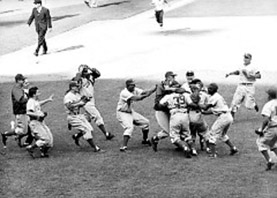 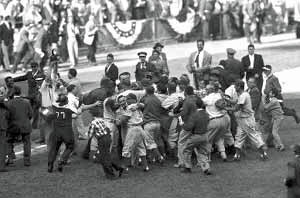
Dodgers and their fans storm Podres.
Game Seven video highlights
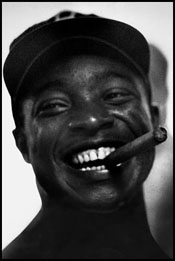
Sandy Amoros
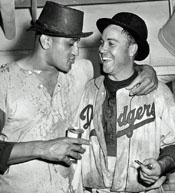
Beer-soaked Newcombe
and Snider
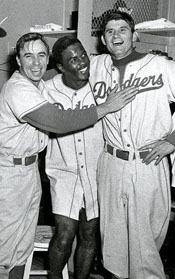
Reese, Robinson, and
Preacher Roe rejoice.
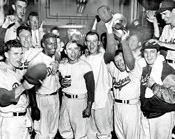
Dodgers exult.
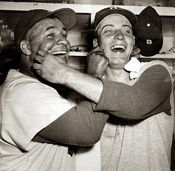
Campanella and Podres
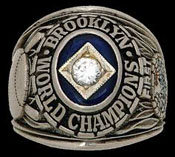
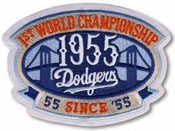
|
Postgame
The Yankees, with one exception, were philosophical in defeat.
- Billy Martin burst into tears as soon as the final out was registered. He hurried from the dugout to the clubhouse, where he pounded on the lockers, making his hands bleed. He hid in the trainer's room to hide his sobbing from his teammates and reporters, finally emerging after an hour. One reporter who waited for him was a lawyer named Howard Cosell who complimented Billy on his fine play in the Series - .320 with 4 RBIs. I'm disgusted that I let down Casey. A man like that shouldn't have to lose a World Series. It's a shame for a great manager like that to have to lose.
The Amoros catch was a sore point with Martin the rest of his life. There is no way Amoros should even be there. Brooklyn had a good pitching staff and maybe we don't win, but that game should have been tied in the sixth inning.
- One anonymous Yankee summed up the season like this. Maybe we expected this. Forget about our being crippled. Maybe that was or was not a factor, but we went as far as we could. Most of us felt that we were lucky even to have been in the series. We didn't deserve to win the pennant. The Cleveland club had better pitching than we had all season. And in the series, the same was true about Brooklyn's pitching. They played good ball, better ball than we played, so how can we feel sad?
- Stengel singled out Labine, Podres, and Snider for praise, then turned his thoughts toward 1956. The Yankees will be good enough to be strong contenders all the way in 1956. We'll have to do some thinking about shortstop. Then there is the job of getting someone to help Yogi Berra behind the plate, and I think maybe Elston Howard will do some catching, just to give Yogi a rest from time to time. My starting pitchers ... should be all right. Of course, no manager can have too much pitching. I'll have to do some looking around for relievers. Old Case rejected any idea of retiring. I have a contract to manage the Yankees.
- Berra was asked what hurt the Yanks the most. Without hesitation, he replied, That catch by Sandy Amoros. Stengel was asked if he considered having Yogi bunt in that situation. I never for an instant wanted Yogi to sacrifice. I was playing to win, not tie. I was going for a big inning. Besides, there was no assurance that even if Yogi had moved the runners along that anyone else would drive them home. We weren't doing any driving against Podres. Berra was my big chance.
- McDougald, who had rounded 2B when Amoros caught Berra's fly, gave his view of the play. I didn't think Amoros would catch the ball. I thought he might shy away from the LF fence. ... I know this much. If Amoros had not caught the ball, I would have scored from first.
- 37-year-old Phil Rizzuto repeated his previous statements that he expected to play in 1956. If the Yanks want me - of if any other club wants me ... [NY released him after 31 games in '56.]
Mantle recalled what he saw when he left the locker room: The crowd stayed on long after the players had left the park. The last I looked, little kids were running the bases, and measuring their shoes against the spike marks Podres had left in front of the mound. The Dodgers had done what seemed for so long to be undoable and unthinkable. They had won their first World Championship.
It was fitting that Gil Hodges would drive in both runs, repaying the fans for their support when he endured that awful 0 for 21 slump in 1952. It had to be a very emotional moment for their captain, Pee Wee Reese, who had been on the 1941 Dodger team that lost the Series when catcher Mickey Owen missed a third strike; and the '51 team that was shell-shocked by Bobby Thomson's home run.
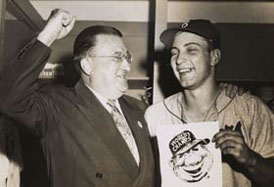 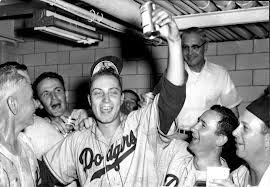
Podres celebrates with owner Walter O'Malley and his teammates
The Dodger clubhouse had the usual victory jubilation but ratcheted to a higher level by the joy of providing Flatbush with its first championship.
The Series netted $2,237,515. The players' share from the first four games amounted to $654,853.
Dana Mozley wrote in the Daily News the next day: Perhaps because of a breeze that grew in the Bronx, a world's championship flag can now be raised in Brooklyn for the first time. Certainly the one play that broke the Yankees' back was Sandy Amoros's great sixth-inning catch and resultant double play. He said an incoming wind held the ball just long enough for him to catch it.
|
Within minutes of the final out, fans began gathering around Ebbets Field to start a celebration that lasted into the wee hours.
New York's telephone switchboards received the most traffic since V-J Day ten years earlier. The overloaded system went down for 17 minutes. In Manhattan, people working in skyscrapers tossed tons of confetti from their windows. Horns honked across the city. Effigies wearing Yankee uniforms were hung from lampposts. The owner of Joe's Deli in Brooklyn set up a sidewalk stand and started handing out free hot dogs to passersby.
O'Malley threw a victory party that evening at the Bossert Hotel in Brooklyn.
Campy recalled the scene. The streets were clogged with cheering fans and it was difficult to get into the hotel. Fans were milling around the hotel, dancing and singing in the streets. All of Brooklyn was celebrating. People were cruising around in cars, honking horns, throwing confetti, and really letting their hair down. I never saw anything like it before or since.
|
|
For the first time, sportswriters elected a World Series MVP and, of course, chose Podres, who received a new car as his prize. After being named Sportsman of the Year by a second-year magazine named Sports Illustrated, Podres was drafted into the army that winter. The publicity surrounding the single, 1-A young star
pressured his draft board to select him just as Billy Martin had been recalled after smacking a record 12 hits for the Yankees in the 1953 Series.
Johnny's induction angered Ted Williams, who had been recalled to the air force during the Korean War after having served in World War II. Podres is paying the penalty for being a star. If Podres had lost those series games, he would probably still be with the Dodgers. Gutless draft boards and gutless politicians get a few letters and panic. They make an object lesson out of a guy like Podres. They make me sick.
|
1955 World Champion Brooklyn Dodgers
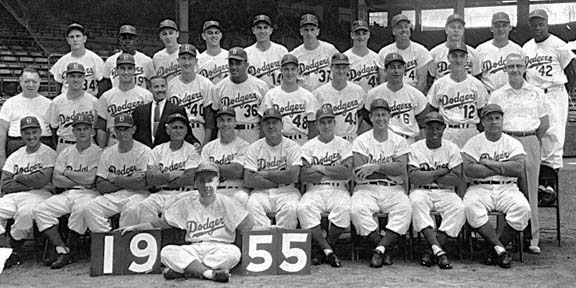 References: It's Good to Be Alive, Roy Campanella (1959)
Dynasty: The New York Yankees 1949-1964, Peter Golenbock (1975)
Bums: An Oral History of the Brooklyn Dodgers, Peter Golenbock (1984)
The World Series, David S. Neft and Richard M. Cohen (1990)
When the Cheering Stops ... Former Major Leaguers Talk about Their Game & Their Lives,
Lee Heiman, Dave Weiner, Bill Gutman (1990)
The Era 1947-1957: When the Yankees, the Giants, and the Dodgers Ruled the World, Roger Kahn (1993)
All My Octobers: My Memories of 12 World Series When the Yankees Ruled Baseball,
Mickey Mantle with Mickey Herskowitz (1994)
The Seventh Game, Barry Levenson (2004)
Center Field Shot: A History of Baseball on Television, James R. Walker and Robert V. Bellamy Jr. (2008)
Yogi Berra: Eternal Yankee, Allen Barra (2009)
Billy Martin: Baseball's Flawed Genius, Bill Pennington (2015)
The 50 Greatest Dodgers Games of All Times, J.P. Hoornstra (2015)
|
|




